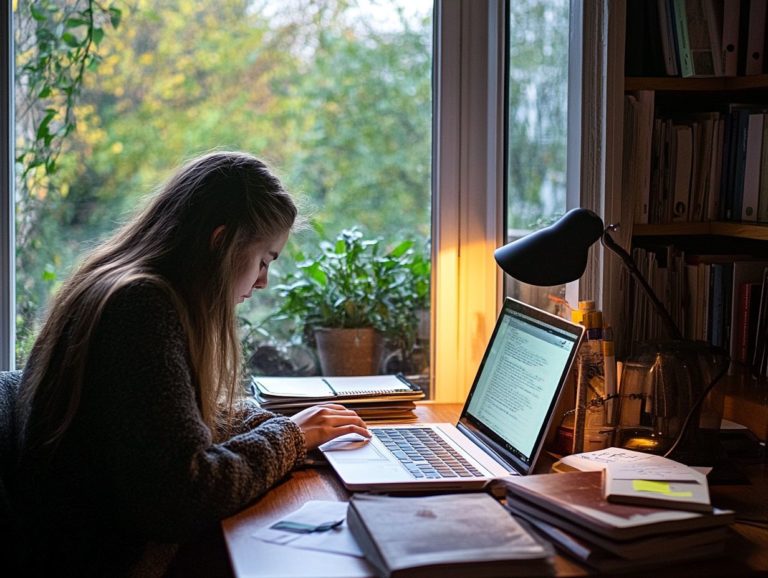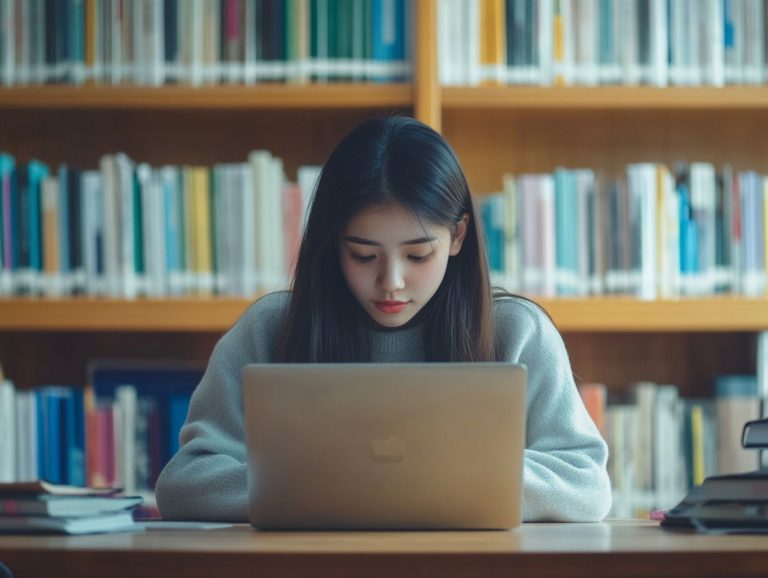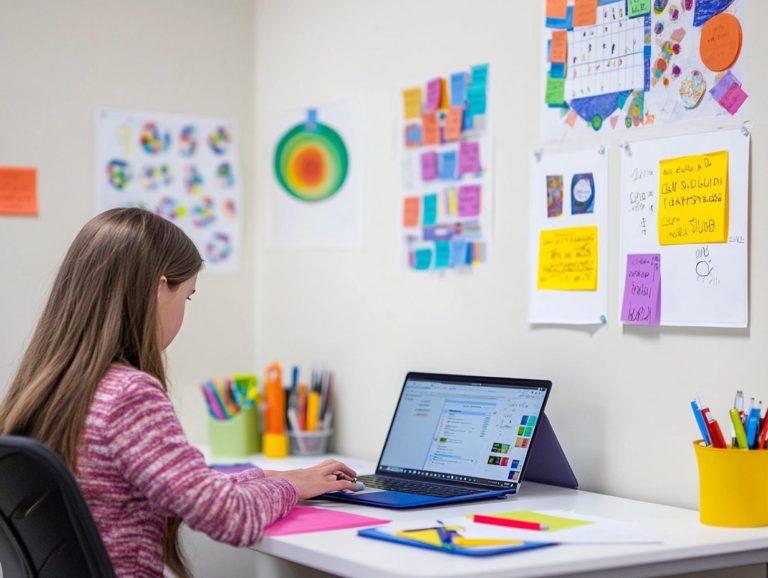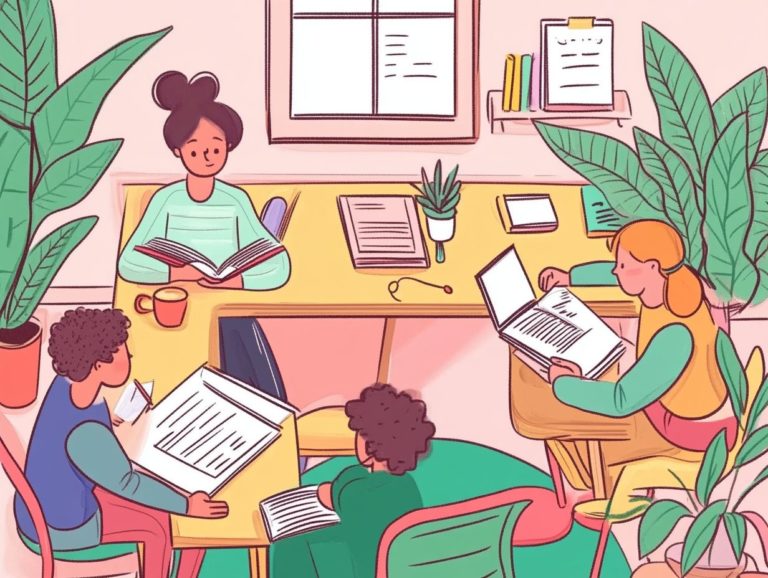how to balance study techniques and leisure
Balancing your study time with leisure is essential for achieving academic success while nurturing your overall well-being.
Using effective study techniques can enhance your learning and retention. Incorporating leisure time is pivotal in boosting your productivity.
Explore strategies for crafting a balanced schedule and overcoming common challenges in time management.
Discover the perfect harmony between your academic pursuits and the well-deserved downtime that recharges you!
Contents
- Key Takeaways:
- The Importance of Balancing Study and Leisure
- Effective Study Techniques
- The Benefits of Leisure Time
- Creating a Study and Leisure Schedule
- Overcoming Challenges in Balancing Study and Leisure
- Frequently Asked Questions
- What are some effective study techniques for balancing academics and leisure time?
- How can I prioritize my time between studying and leisure activities?
- What are some leisure activities that can also improve my study skills?
- How can I avoid feeling burned out while trying to balance study techniques and leisure?
- How can I stay motivated to balance my study techniques and leisure?
- What should I do if I feel like I am neglecting either my studies or leisure time?
Key Takeaways:

Finding balance between study and leisure is crucial for success.
Use effective study techniques to boost productivity and reduce burnout.
The Importance of Balancing Study and Leisure
Balancing study and leisure is essential for your academic success, especially as an international student navigating the vibrant landscape of a city like Manchester.
Diving into your studies is undeniably important. It’s equally vital to carve out time for leisure activities that enhance your well-being and mental health.
A well-crafted balance fosters effective learning, boosts your productivity, and helps reduce stress.
This balance allows you to fully immerse yourself in the cultural richness Manchester has to offer, from the Manchester Art Gallery to the serene expanses of Heaton Park.
Self-care practices can transform your educational journey into a fulfilling experience, encouraging personal growth and sparking your creativity.
Why Finding Balance is Essential for Success
Finding the right balance between study and leisure is key to achieving academic success and nurturing your mental health.
When you master time management, you create a structured approach that allows for ample opportunities to engage in both your academic pursuits and personal interests.
This equilibrium boosts your productivity and significantly lowers stress levels, which can otherwise impede your performance.
Engaging in self-care routines and leisure activities is essential as a counterbalance to the demands of academic life. These moments of respite rejuvenate your mind, spark creativity, and enhance focus.
Make downtime a priority today for a healthier, happier you!
Effective Study Techniques
Employing effective study techniques is essential for enhancing your learning and retention, particularly in today s dynamic study environment.
Using digital planners can significantly aid in organizing your study schedules while optimizing your time management.
Techniques like the Pomodoro Technique a time management method that uses timed intervals for study sessions and breaks encourage you to engage in focused bursts of learning.
Group study sessions cultivate a collaborative learning atmosphere, allowing you to exchange ideas and deepen your understanding.
By adopting these effective learning strategies, you not only bolster your memory but also gain valuable insights into tracking your progress toward your academic goals.
Strategies for Maximizing Learning and Retention

Maximizing your learning and retention involves employing proven strategies that enhance the effectiveness of your educational efforts.
Using methods like active recall engages your memory dynamically, reinforcing information instead of merely absorbing it passively.
Spaced repetition works hand-in-hand with this approach, strategically timing your review sessions to match your brain’s natural forgetting curve. This technique allows for deeper cognitive processing over time.
Self-testing is another powerful tool at your disposal, enabling you to gauge your understanding and identify knowledge gaps.
When you combine these strategies with effective time management techniques, you’ll boost both your memory recall and overall learning efficiency, transforming your educational journey into a more productive and fulfilling experience.
The Benefits of Leisure Time
Engaging in leisure activities offers a wealth of benefits that significantly enhance your overall well-being, productivity, and stress relief.
When you take breaks from academic commitments, you give yourself the invaluable opportunity to recharge both mentally and physically. This recharge is essential for a healthy lifestyle.
Activities like exercise and mindfulness practices not only elevate your mental health but also sharpen your focus and ignite your creativity. This results in more effective study sessions.
By fully embracing your leisure time, you can cultivate a balanced lifestyle that nurtures both your academic pursuits and personal development.
How Taking Breaks Can Improve Productivity
Taking breaks is essential for enhancing your productivity and cultivating a healthy study routine. When you step away for a moment, you give your mind the chance to recharge. This paves the way for clearer thinking and heightened creativity.
Think of these scheduled breaks as your personal reset button. They promote sharper focus when you dive back into your tasks.
Use relaxation techniques, such as deep breathing or short mindfulness exercises, to reduce stress significantly. Incorporating these practices can bolster your overall mental well-being.
By prioritizing self-care, you combat burnout and foster a more balanced approach to your work or studies. This allows you to tap into your fullest potential.
These practices are vital for anyone looking to maintain a sustainable and effective workflow.
Creating a Study and Leisure Schedule
A well-structured study and leisure schedule is crucial for your success, especially for students balancing academic responsibilities with personal interests.
A flexible schedule gives you the power to prioritize tasks and organize your study spaces. This enhances your focus and productivity.
By utilizing digital planners, you can effortlessly track deadlines. This ensures that both your study periods and leisure activities are thoughtfully planned.
This approach fosters a harmonious balance between work and play, ultimately leading to academic success.
Tips for Finding the Right Balance
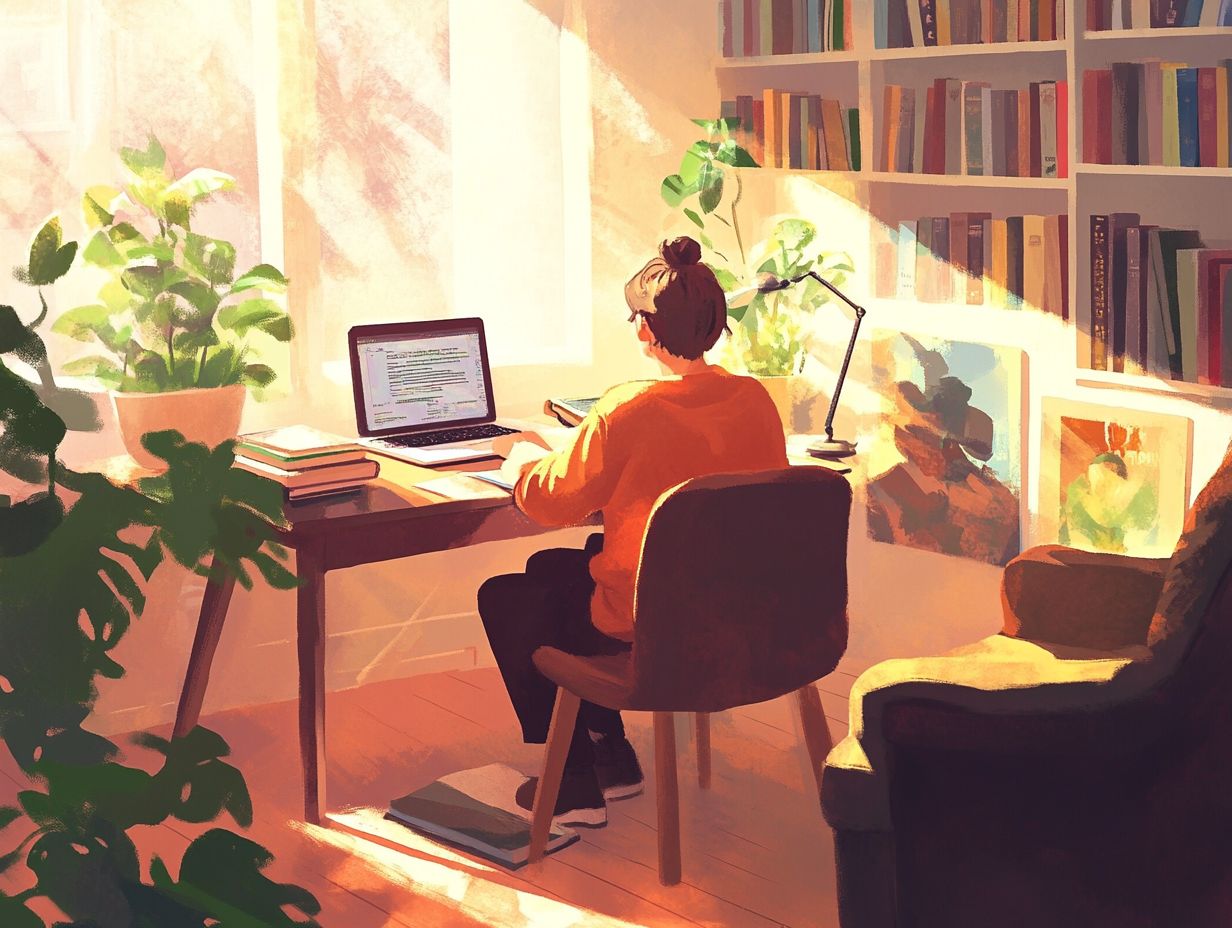
Finding the right balance between study and leisure hinges on mastering effective time management and self-discipline. To achieve this harmony, consider how to switch between study techniques and set realistic goals that resonate with your personal capabilities and commitments.
A flexible schedule is essential; it allows for adjustments based on daily challenges and energy fluctuations. This flexibility makes it much easier to stay on track.
Prioritizing tasks is vital. Tackle high-priority assignments during your peak concentration periods, reserving lighter tasks for when your energy dips.
Incorporating techniques like the Pomodoro Technique, which involves studying for 25 minutes followed by a 5-minute break, can significantly enhance your focus. This ultimately cultivates a sustainable approach to both productivity and relaxation.
Overcoming Challenges in Balancing Study and Leisure
Overcoming the challenges of balancing study and leisure is crucial for preventing burnout and ensuring sustained academic success.
By mastering effective time management and prioritizing tasks, you can navigate your academic commitments while still indulging in leisure activities.
Embracing supportive resources and seeking community support will give you the power to develop strategies that alleviate stress. This creates a fulfilling study-life balance that fosters your long-term well-being.
Managing Time and Prioritizing Tasks
Managing your time effectively and prioritizing tasks are key to academic success. By adopting a structured approach, you not only enhance your learning outcomes but also alleviate stress.
For example, employing techniques like the Eisenhower Matrix allows you to categorize tasks based on urgency and importance. This enables you to focus on what truly matters.
Breaking larger projects into smaller, manageable chunks helps you combat procrastination and fosters a rewarding sense of accomplishment as you complete each task.
Maintaining a dedicated study schedule and setting specific goals will further enhance your self-discipline. This ensures that your time is used wisely and that your academic performance steadily improves over time.
Frequently Asked Questions
Ready to find your balance? Start by planning your next study session today!
What are some effective study techniques for balancing academics and leisure time?

Effective study techniques can help you find balance between study and rest. Create a schedule, set specific study goals, take breaks, and use active learning methods.
How can I prioritize my time between studying and leisure activities?
Start by determining your academic goals and deadlines. Then, set aside specific time blocks for studying and leisure, prioritizing your academics.
What are some leisure activities that can also improve my study skills?
Leisure activities can enhance your study skills. Reading for pleasure, playing strategy games, and engaging in physical activities can boost focus and concentration.
How can I avoid feeling burned out while trying to balance study techniques and leisure?
To avoid burnout, take regular breaks during study sessions. Engage in leisure activities that help relax and recharge your mind.
How can I stay motivated to balance my study techniques and leisure?
Stay motivated by setting specific goals for both academics and leisure. Find a balance that suits you, whether alternating between activities or integrating them.
What should I do if I feel like I am neglecting either my studies or leisure time?
If you feel like you’re neglecting studies or leisure, reassess your priorities. Communicate with friends, family, or a mentor for support as you find a balance.

